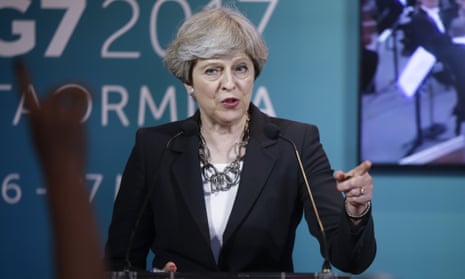Ever since anyone can remember, there have been complaints that British elections have become “too presidential”. Back in the 1970s, when the principals were Ted Heath and Harold Wilson, their duel was ridiculed as “a man with a boat and a man with a pipe”.
So this spring’s contest, with its relentless focus on the woman with the bag and the man with the beard, is not so much a new development as the culmination of a long-established trend. This was by Tory design because making it a personality contest was supposed to be to their benefit. The name of Theresa May is emblazoned on her campaign coach in lettering so enormous that it probably can be seen from outer space. The word Conservative is a microscopic footnote. The Tory campaign has been organised around the projection of the Supreme Leader to the virtual exclusion of every other member of the cabinet. Even Margaret Thatcher in her pomp would share appearances with her ministers. Mrs May has granted just the one “podium moment” to a member of the cabinet when she appeared alongside Philip Hammond and conspicuously failed to reassure the chancellor that he was safe in his job.
I, myself and me. That is how she likes to start her sentences. She asks for an enlarged majority to “give me a mandate” to negotiate Brexit. “I offer myself as your prime minister” – no nonsense about being the captain of a team. When she launched her programme, it was “my manifesto for Britain’s future”, words that soon came back to haunt her when one of its key policies began to unravel.
When this contest kicked off, there seemed to be a compelling logic to making the Tory campaign so May-centred. The ratings of an apparently well-regarded leader were superior to those of her party. Mrs May wanted this to be a very personal win so she would have a very personal mandate, the better to stamp her will on her government after the election. She did not want to share the spoils of victory with anyone else. The role assigned to colleagues was merely to bask in the reflection of triumphant gloriana and wait to hear if they were going to get a job in her next administration. She wanted Tory candidates to be in no doubt that they owed their seats in parliament and all their loyalties to her.
The clinching reason for fighting a presidential campaign was Jeremy Corbyn. She bested him by huge margins when the Tories conducted their private polling and asked their focus groups who would make the better prime minister. To any swing voter harbouring doubts about whether the Conservatives deserved an engorged majority, the answer was simply to ask them to close their eyes and imagine the Labour leader standing on the threshold of Number 10. The voters’ appalled imaginations, so Team May assumed, would do the rest of the Tories’ work for them. The weekend after she called this snap election, I reported to you about the foremost anxiety among cabinet members. Their main worry then was that their poll lead was so huge that it would induce complacency among Tory supporters.
You may not be entirely surprised to learn that I am hearing different anxieties from Tories now. Concerns about their leader and about the conduct of what they call a poor campaign. A sequence of polls has suggested that the public’s estimation of Mrs May is falling and that the Tory advantage over Labour is shrinking. There was particular alarm when YouGov produced a poll suggesting that the gap might have closed to just five points. This brought a distinct rattle into the voices of Tories and has even had some of them wondering whether they are blowing what was supposed to be the unlosable election.
That is not because they or anyone else can be sure that the polls are to be relied upon. My conversations suggest to me that even the pollsters aren’t that confident of their numbers. They have tried to correct for the mistakes that they made in 2015, when they overinflated the Labour share because their samples were not sufficiently representative of who would turn up at the polling stations and what they would do there. The pollsters cannot know whether the changes to their methodologies have been the right ones. The point about the polls is that the Tories would not be so twitchy about them if their faith in their leader had not already become eroded and their confidence had not become rather brittle.
The focus on leadership, the “presidential” strategy that looked such a no-brainer when this election was called, has not had the effect that most anticipated. I think some of this is down to Jeremy Corbyn. Not because he has fought an outstanding election, but because his frailties as a candidate for the premiership were extremely well known before the campaign had started. A hefty majority of his own MPs had previously declared him unfit for leadership, so anything the Tories had to add to that was likely to be superfluous comment. I expect the Tories to launch a monstering of the Labour leader in the final leg of the campaign. This may not have the impact that they are looking for, if I am right to suspect that attitudes towards him were already largely baked in to Labour’s share.
What such a very presidential Tory campaign, which has boiled down to saying that Mrs May is simply entitled to be prime minister, has invited people to do is make a closer inspection of her character. Many voters began the campaign saying that they liked what they saw, but they were working on the basis of not having seen all that much of a woman who rarely looks at ease under scrutiny. A few of us have said for some time that she is not the most awesome political genius ever to walk the planet. She is a mixed bag of strengths and weaknesses who has been greatly flattered by the absence of competition from within her own party and among her rival leaders.
I have long anticipated a downward correction in how she is regarded. Where I was wrong was in thinking this re-evaluation would begin after the election rather than during it. The campaign has made some of her deficiencies more apparent to her fellow Tories, the media and the electorate. The dreadful mess she got herself into over social care was a defining moment. A highly contentious policy on a very combustible issue was conceived with virtually no consultation of ministers, not even those relevant to its implementation. When it provoked ferocious hostility, other Tories were very happy for it to be “her manifesto” and therefore not one they felt they had any responsibility to defend. Only a few May loyalists – the work and pensions secretary, Damian Green, prominent among them – were prepared to do battle for her. So were some commentators who commended Mrs May for her audacity. They were left to feel like fools when their support was rewarded with a screeching U-turn by Mrs Strong and Stable. She became the first party leader to ditch a central manifesto policy in the middle of a campaign. She then took everyone else for fools by trying to pretend that “nothing has changed” when it so palpably had. It was the first time in her 10 months as prime minister that I have seen journalists respond to her with open mockery.
As damaging as the U-turn itself, the episode drew attention to the lack of anything much by way of a positive offer from the Tories. The Institute for Fiscal Studies has audited the promises of the Tories and Labour and castigates both for their lack of honesty. I hear a different complaint from Conservative campaigners. This is that Mrs May has given them nothing to sell on the doorstep. They report that voters can cite popular offers from Labour while all anyone can recall about the Tory prospectus is the things that they plan to take away from people.
Then came the atrocity in Manchester. Debbie Hicks, a Labour official in Stroud, attracted a lot of opprobrium for remarking: “I can’t help thinking this is wonderful timing for Theresa May.” Ms Hicks was stupid to say out loud what people on all the campaigns were thinking. The general assumption among both Tory and Labour campaigners is that the terrible murders in Manchester play to Mrs May’s strengths as a former home secretary and to her party’s advantages when voters are asked whom they trust with security issues.
In the final stretch of the campaign, I expect the Tories to keep it presidential. To do otherwise would be to signal panic and publicly confirm that their leader has wilted under scrutiny. A diminished Mrs May still bests Mr Corbyn on “who will keep Britain safe” and nearly all the other key qualities that voters look for in a leader.
She is still on course to win, but it will not be the unvarnished victory that she was looking for when she began this campaign. Her armour has been dented and some of its chinks have been exposed to a wider audience. A campaign designed to profit from her opponent’s weaknesses has turned out to be most educative about her own flaws.

